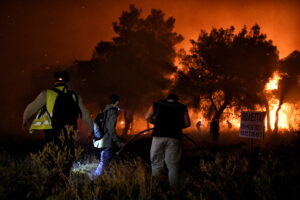Over the past couple of weeks, the news cycle has been inundated with reports of extreme weather events across the globe. Wildfires in Southern Europe and Los Angeles and floodings in Africa, Europe and Asia have devastated many people and destroyed property. The severity of the implications of climate change has never been more pronounced. Summer months are increasingly getting hotter. As a result, heatwaves are turning forests into fuel that aid burning. Unfortunately, these conditions are making wildfires more frequent and deadly. In Greece, temperatures reached 45oC, one of the hottest summers in over three decades.
Recipe for a Wildfire
Wildfires are unplanned and uncontrolled fires that burn vegetation and grassland. They usually occur in rural and sparsely populated areas.
For an uncontrollable wildfire to occur, two main things are necessary; a warm climate that dries out vegetation over time (turning it to kindling) and a source of ignition (the spark). In some cases, wildfires are started by nature, with the ignition coming from lighting strikes. But in many cases, they are caused by anthropological factors. For example, in many rural communities, farmers start wildfires and are used to clear an area for planting or converting forests to pasture for animal grazing. In recent years, the potency and extents of these fires have increased and are now a cause for alarm; why?

Climate Change as an Accelerant
With increasing climate change, the intensity of wildfires has increased over the years. Climate change affects wildfires by increasing the risk of fires and extending the length of fire seasons. A hotter and longer dry spell results in drier vegetation that can easily catch fire and a longer burning period.
With altered weather patterns, such as prolonged drought and intense heatwaves, the effects of climate change have increased the severity of wildfires. This can be seen in recent fires, from the Amazon rainforest fire to the Australian and California wildfires last year and now the Greece and Turkey wildfires.
This year has produced one of Southern Europe’s worst wildfire seasons. The European Forest Fire Information System stated that the number of fires in 2021 alone had exceeded previous year averages. This year, a total of 180 wildfires have affected 38 different provinces in Turkey. In addition to indirect activities that contribute to global warming, direct activities of humans are also responsible for the increased fires being witnessed. Change in human land use is another factor that has led to increased wildfires.
It needs not be said that global warming presents the biggest threat to our existence. However, we must collectively come together to battle this threat because the next time we may be forced to wear protective masks may not be due to a deadly virus; rather, it will be to prevent smoke inhalation as our planet burns.